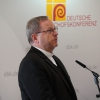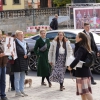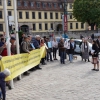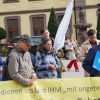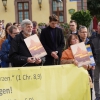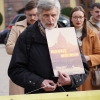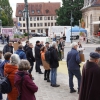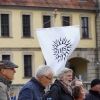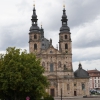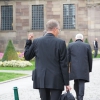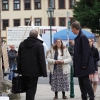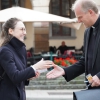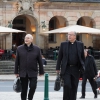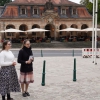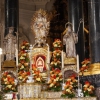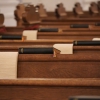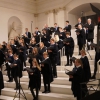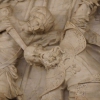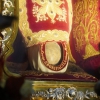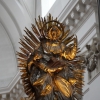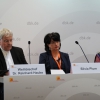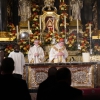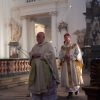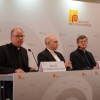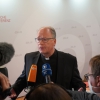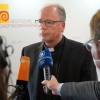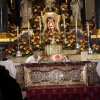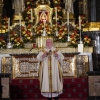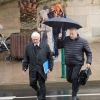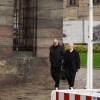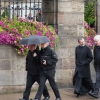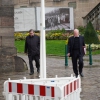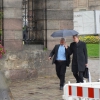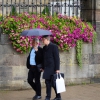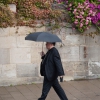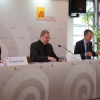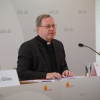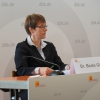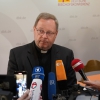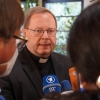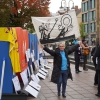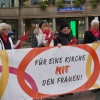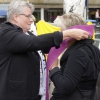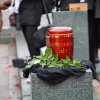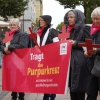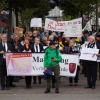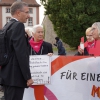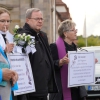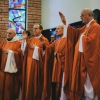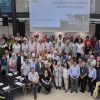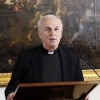Artikel
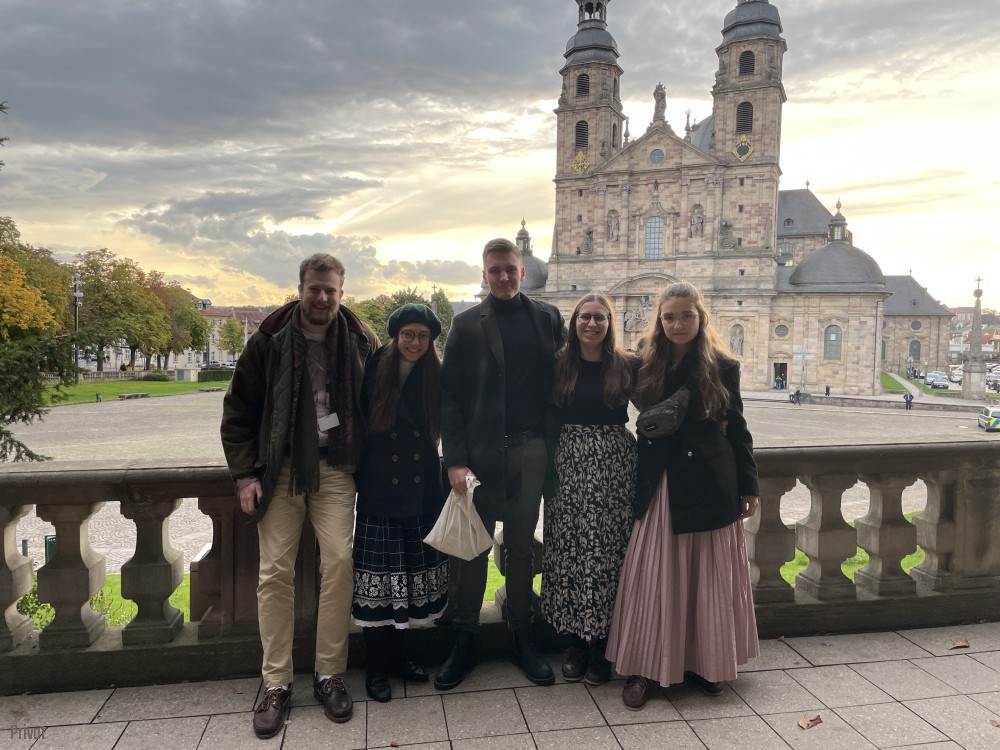
Report on the fall conference of the German Conference of Bishops on 26. – 29. September 2022 in Fulda, Germany
Day 1 – Monday, Sept. 26, 2022
A cool wind blew on the Fulda Cathedral plaza that morning. Hardly anything was going on yet; only a few tourists and press people scurried across the expansive square in the heart of the old town. Then, inside the cathedral, there was a hustle and bustle: A church guide explained to a tour group that the cathedral is only so richly decorated, as it was then, for high church festivals. Men laid cables for the upcoming transmissions from the cathedral church, the sacristans ironed the altar cloths and adjusted stools. One by one, the bishops arrived at the seminary, while the men and women of the press picked up their accreditation badges.
The bishops’ conference began on time at 2:30 p.m. with the press conference in the cathedral parish center. Press spokesman Kopp, Bishop Bätzing and Mrs. Gilles appeared before the numerous representatives of the press. During the course of the day I was told over and over that the autumn meeting is different, more weighty. This is hardly surprising, if one looks at the past synodal assembly in Frankfurt and the upcomingad limina visit to Rome. Much is in turmoil, in the process of re-emergence, in uncertainty. Bishop Bätzing presented an overloaded agenda that could probably have been described as extremely ambitious. It remained to be seen whether all the topics he mentioned could be given the time they deserved. Among other things, the Ahrtal flood and the role of the church, the future of abuse work with the farewell of the “old” DBK commissioner and the presentation of a “new” man in this important function, a review of the fourth synodal assembly and planning around thead limina visit of the German bishops would be addressed. After the press statement and some questions from the media, everyone dispersed.
The next item on the agenda was then the picture session in the Fulda City Palace. Almost all of the 67 bishops present made their way on foot to the press photo site and thus passed directly by the Maria 1.0’s prayer demonstration. 50 people gathered there to show their presence praying, singing and carrying signs. The central message, as could be heard again and again in the conversation, was: “Majority does not yet create truth, especially when some majorities only exist on the German level anyway.”
Day 2 – Tuesday, Sept. 27, 2022
I set off for the cathedral a little earlier to capture the atmosphere around the opening service and to visit the tomb of St. Boniface. The atmosphere was less expectant than the day before: the morning calm was mixed with a distinctly serious mood until the young cathedral choir finally broke the silence with their singing. In addition to the transmission team, the liturgical team, a few faithful and some onlookers, only a few other representatives of the press came, some of whom visibly lost interest after the end of the sermon. In his sermon, Bishop Bätzing emphasized that he is suspicious of "continuities that were all too certain,i.e., things have always been like this, always been believed like this; what was wrong yesterday cannot be right today.”
After Holy Mass, I stopped by Bishop Dyba's tomb, and as I was leaving the cathedral church, I stumbled into an unpleasant incident: in front of the cathedral, a cluster of people had formed around a middle-aged gentleman who had tried to steal the Eucharist. Some attentive sisters and ushers together with a cathedral canon were able to stop him and secure the host, which he had crumbled in the meantime out of anger. The man left and I accompanied the canon to a side altar where, after a few prayers together, he consumed the fragmented host.
A press conference was held at 1.00 pm on the topic “A year after the flood: church aid to reconstruction, emergency counseling, and commitment to the people.” I was impressed by Ms. Plum from Caritas flood relief coordination and Ms. Nagel, an emergency counselor of the Aachen region, and their description of the dramatic situation on site, what measures were taken and where the church offered people space and help.
A sentence by Ms. Plum made me think, when she said that people often did not want to or were not able to pray, so that they “only” met in the churches for breakfast to plan the further course of action and to exchange information. Apparently, the local clergy did not want to or could not burden people with “prayer” on top of everything else. Unfortunately, the two bishops present did not emphasize that especially in such difficult situations, prayer and the sacraments can develop great power and give people additional help and comfort; overall, Bishop Kohlgraf and Auxiliary Bishop Hauke did not impress. The emergency pastoral care situation, the panel agreed, must continue to invest and expand in personnel, especially since the needs of people in these days will not diminish, but uncertainties and fears will continue to grow. After lunch, the bishops again moved with some delay up to the Fulda City Palace to resume their deliberations. Bishop Bohdan Dsjurach CSsR, Apostolic Exarch for the Ukrainians of the Byzantine Rite in Germany and Scandinavia, in a brief conversation expressed concern about the problematic situation of the local Church in Germany and said that despite all the problems, the Church still belongs to the Lord.
Day 3 – Wednesday, Sept. 28, 2022
As during the last days, the weather in Fulda graced us with wetness and overcast skies. Nevertheless, many journalists came to attend the morning Mass, which was presided over today by Cardinal Woelki. Not surprisingly, Woelki's homily offered no barbs or criticisms - it remained sober and descriptive throughout. Bishop Bätzing, however, had taken the opportunity the day before to admonish his theological “opponents.” As every day, the bishops set off after breakfast for the meeting room in the city palace. On this day, among other things, the agenda included a section on the Synodal Path, where invited guests could have their say. In conversation with some of the bishops, the rabid tone of Sister Kluitmann was particularly criticized; she openly stated that “the fish always stinks from the head.”
I used the free time in the morning to get into conversation with various people around the cathedral square. Among other things, I asked about their opinion of the Catholic Church, necessary reforms and wanted to know from them, “Why believe at all?” The answers differed from interviewee to interviewee, sometimes immensely. Of course, this was also due to the respective church connection, origin, or personal interests. When I look back on the many conversations, I clearly notice that the church has completely left out one focal point in recent decades, which is now becoming more and more apparent: what actually constitutes the Catholic faith and what people need it for. Of the 20 interview partners, no one was able to give me an answer that morning. Only partial aspects such as community and social issues were mentioned; however, the fact that God wants to give man life in abundance, has bought him life through his death and resurrection, and that we hope one day to live eternally in his kingdom, was such a surprise to the interviewees that some asked me if I was joking – in short, they were completely surprised to hear this and reported back that they had never heard this before.
At 1:00 pm the press conference followed on the subject of “Coming to terms with sexual abuse in the ecclesiastical sphere.” Bishop Dieser was elected by the bishops to succeed Bishop Ackermann in the post of DBK commissioner for sexual abuse issues; Archbishop Burger will support him as vice-commissioner. A rough outline was given of the many measures taken and the progress made over the past 12 years, and it became clear that while some steps have been taken, there is still a long way to go for the Church in Germany. The duo of Dieser and Burger will continue to work tirelessly in this so important matter. The room of the press meeting was filled to capacity and all the important television stations were present. The press questions were aimed in a variety of directions and were wide-ranging. Only once did the topic of the Synodal Path come up: Mr. Frank from theKölner Stadtanzeiger newspaper had asked about the role of the Synodal Way, especially about the signal that the rejected basic text would send. Bishop Dieser replied that although the text had not received the required majority, the majority of the bishops had nevertheless approved it.
4. Thursday, Sept 29, 2022
The final day of the meeting was a busy one. The day began at 7:30 am with a Holy Mass presided over by Cardinal Marx. The ranks of the bishops had thinned out considerably compared to the previous day. Only about half of the bishops in session came to the joint Eucharistic celebration that morning. To the question of the editor-in-chief of Domradio.de, a Catholic radio station in Cologne, where the other bishops had been, Bätzing answered evasively at the concluding press conference. In his sermon, Cardinal Marx emphasized the importance of "searching". For a long time, the Church, according to Marx, wanted to convey only content, what must or must not be believed, but forgot about searching. He reminded us that even statements from Scripture and tradition are always only analogies when it comes to talking about God.
Immediately before the lunch break, Bishop Dieser (the new commissioner for sexual abuse issues) and Archbishop Burger (his vice) took some time to talk with those affected who were represented with a stand in front of the Fulda City Palace throughout the days of the conference.
The final press conference followed at 2 pm with the bishops continuing to meet throughout the afternoon. In addition to brief summaries of topics that had already been discussed in detail in the other press conferences, the Synodal Way in particular became the focus of the press briefing, especially with regard to the upcomingad limina visit. Again and again, as in the previous days, the journalists asked the question about the unanimity or the mood among the German bishops. Slightly annoyed, Bishop Bätzing stated yet again that despite the different positions there was a certain episcopal collegiality – but he himself did not seem to be completely convinced of it. He summed it all up in the expression: consensus over dissent. The autumn bishops’ conference was not able to resolve the episcopal dissent that was clearly evident at the last synodal assembly.
Bishop Bätzing also reacted to statements by Kurt Cardinal Koch in an interview in the Tagespost. Koch stated: "It irritates me that besides the sources of revelation of Scripture and tradition, new sources are being accepted; and it frightens me that this is happening – again – in Germany. This phenomenon already occurred during the National Socialist dictatorship, when the so-called “German Christians” saw God's new revelation in blood and soil and in the rise of Hitler."
Bishop Bätzing considered this statement disturbing and a completely unacceptable misstep. According to Bätzing, Koch thus disqualified himself in the theological debate and he expected a public apology from him, otherwise he would officially complain to the Holy Father. Bätzing went on to explain that Koch was speaking out of fear, namely the fear that something would move, something would change. A gentleman fromCicero magazine pointed out that there are certainly other bishops in Rome who think like Cardinal Koch. Bätzing replied: "With all our argumentative and spiritual strength, we will bring in proposals for changing church doctrine (first of all, on church life and pastoral practice) in our own country, and we will implement a lot of them. Koch meanwhile stated clearly that he would not retract his statement (https://www.die-tagespost.de/kirche/synodaler-weg/koch-antwortet-baetzing-nehme-aussage-nicht-zurueck-art-232671).
After Maria 1.0 was already present with a group of 50 people on the opening day of the plenary assembly, Maria 2.0, Aktion Lila Stola, KAB Würzburg, KDFB Würzburg, the kfd-Diözesanverband Fulda, and Wir sind Kirche e.V. did not miss the opportunity to draw attention to their issues with their own demonstration. About 60 people gathered at the train station plaza and then marched in black clothing as in a vigil with various stations to the cathedral square to Fulda. One of the women symbolically carried an urn in front, which was filled with “scorched earth” at each station. In addition to the classic demands for women's ordination, abuse education, recognition of gender diversity, they wanted to use the march to express their frustration with the slow progress of the Synodal Path and anger at the blocking minority. At the end of the demonstration, they symbolically presented the urn to Bishop Bode and Bishop Gerber. While the participants of the demonstration held a so-called “consolation meal,” sharing wine and bread, Vespers were sung in a crowded cathedral church.
